Table of Contents
Affiliate marketing has emerged as a powerful strategy for businesses and individuals, allowing marketers to earn commissions by promoting products or services from other companies.
Interestingly, data from AffiliateWP show that affiliate marketing contributes between 5% and 25% of major brands’ total internet sales, and its global market size is expected to reach $27.78 billion by 2027.
Yet, despite these impressive figures indicating a positive growth for the industry, a pressing question arises: Are Affiliate Programs Legit?
This question has long been on the minds of both seasoned marketers and newcomers, especially with the mixed reviews and varying success stories, which make it much more difficult to ascertain their legitimacy.
Fortunately, this is where Easy Affiliate steps in. As a trusted platform, Easy Affiliate makes creating an affiliate program a breeze. It provides valuable insights and helps affiliate marketers make informed decisions and succeed in their ventures.
Join us as we embark on a journey to educate you about the benefits of affiliate programs, dispel common misconceptions, and highlight the role of Easy Affiliate in enhancing the effectiveness and trustworthiness of affiliate marketing programs.
The Popularity of Affiliate Marketing
Affiliate marketing can be traced digitally back to 1989, when William J. Tobin, owner of PC Flowers and Gifts, an online flower and gift shop, patented the concept and created an affiliate program for his business, which yielded him $6 million in sales annually by 1993.
However, in the early 2000s, affiliate marketing gained much recognition, with online businesses considering it a solid marketing strategy to increase sales and brand visibility.
Even then, the popularity of affiliate marketing was not comparable to what it is today, especially after the post-COVID era.
The COVID era contributed immensely to the growth of the affiliate marketing industry because of the widespread transition to remote work and online education as people adapted to stay-at-home orders.
This intensified move towards e-commerce led online business owners to devise new strategies to attract and convert new audiences in the digital market, leading to what we know today as performance-based models.
These performance-based models were simply a cost-effective way for online businesses to attract customers and encourage them to purchase their digital products and services.
For this to happen, affiliate marketers were offered juicy commissions for every new customer they could convert for specific online businesses, boosting their revenue and skyrocketing the popularity and growth of the affiliate marketing industry.
Today, affiliate marketing is one of the top three customer acquisition channels for 54% of marketers, with 20% ranking it as their most successful channel.
Insights From Google Trends
Data from Google Trends lets us know that affiliate marketing has consistently surpassed the growth rates of numerous other digital advertising channels, such as content marketing and influencer marketing.
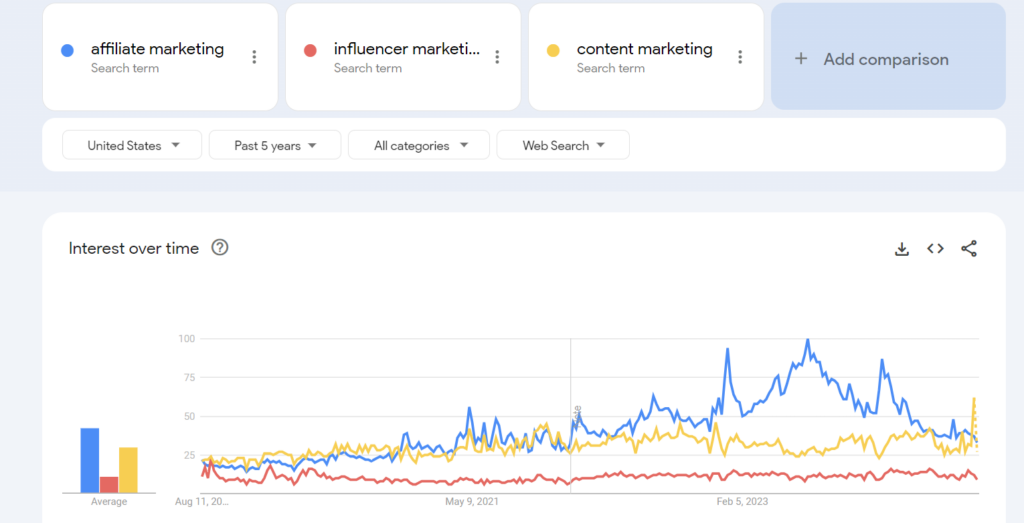
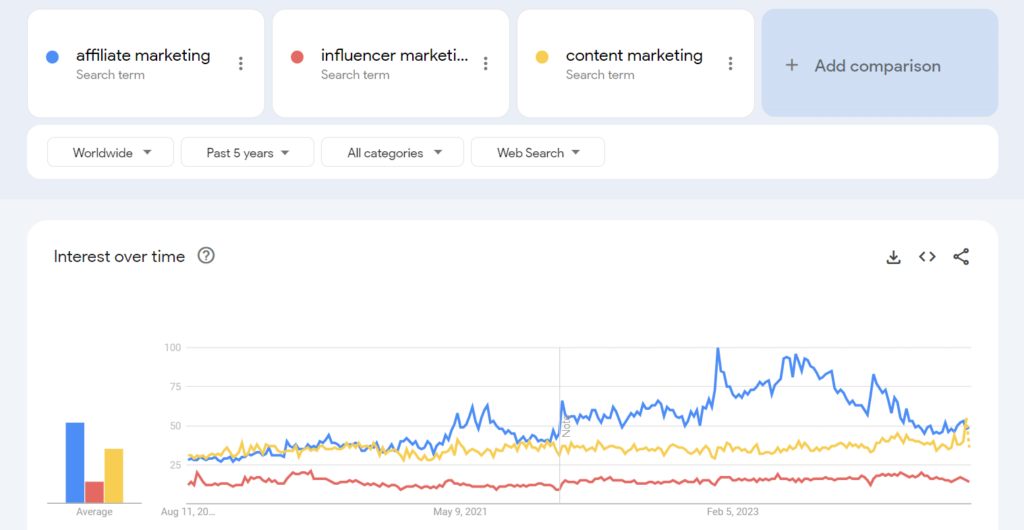
From the images above, you can see that affiliate marketing has outperformed influencer and content marketing over the past five years in the United States and worldwide.
This means businesses that adapted and embraced affiliate marketing and performance-based partnerships as part of their growth strategies thrived as they benefited from expanded reach, new customer acquisitions, and increased market share.
Industries That Have Successfully Implemented Affiliate Programs
Check out some of the industries that have successfully implemented affiliate programs below:
1. E-commerce and Retail
Companies such as Amazon and Walmart in the e-commerce and retail industry are proven examples of businesses that have successfully leveraged affiliate marketing’s full potential.
Amazon, for example, began its affiliate marketing in 1996, which it called Amazon Associates. Individuals who registered for the affiliate program could then place banner or text links on their site recommending specific products or link directly to the Amazon home page.
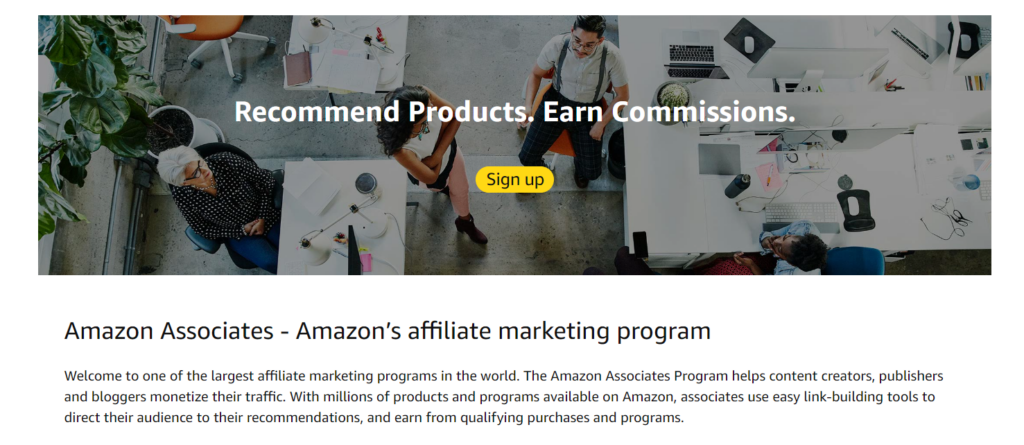
When visitors click on the Amazon Associates website to go to Amazon and purchase a product, the affiliate receives a commission.
Today, Amazon has become an affiliate marketing giant with its affiliate program, Affiliate Associates, becoming the largest affiliate network with 58.5% of affiliate marketers using it.
2. Travel and Hospitality
The Travel and Hospitality industry has been reaping the benefits of affiliate programs for decades. This is evident with thriving businesses in this space, such as Booking.com and Expedia, which have found ways to set up successful affiliate marketing products.
Expedia, for example, launched its Travel Agent Affiliate Program in 2002 in Italy and has since expanded to the UK, France, Germany, Canada, Australia, New Zealand, and the United States. The program currently has more than 8,000 members worldwide.

Booking.com also has a solid affiliate program that offers affiliates as much as a 25% commission rate. Its 24/7 customer service makes it extremely easy for converted customers to make their bookings.

The company is also available in 228 countries worldwide, making it possible for almost anyone to become an affiliate, wherever they may be.
3. Fashion and Beauty
The Fashion and Beauty industry is a top industry that has discovered the benefits and usefulness of affiliate programs simply because many people are very interested in fashion styles and clothing.
Companies like Nike have partnered with sports websites, fashion bloggers, and creators to promote their products to a wider audience and drive sales.
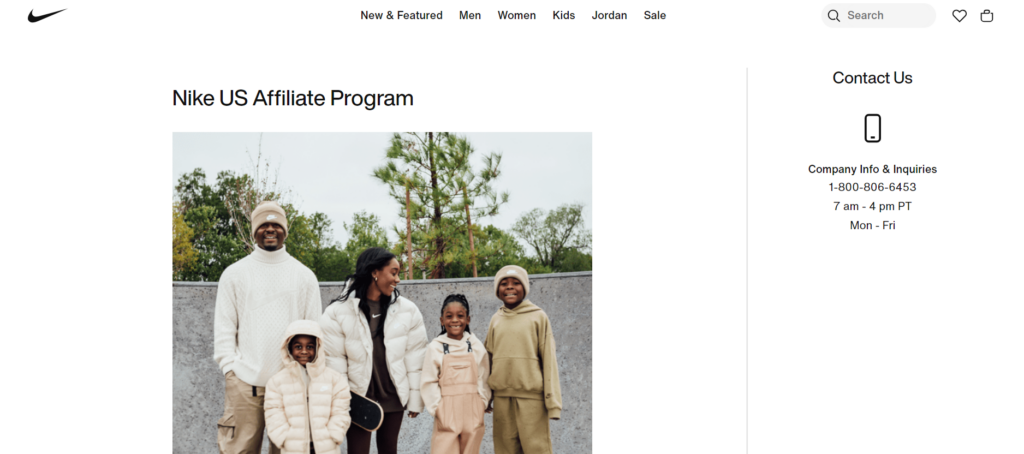
These partnerships are made through multiple affiliate networks, such as Rakuten Advertising and Impact, which allow thousands of affiliates to join and promote Nike products.
Given Nike’s global presence and the massive demand for its products, there is often intense competition among individuals and businesses vying to become their affiliates. However, it is quite a rewarding venture should you become one.
How Affiliate Programs Work
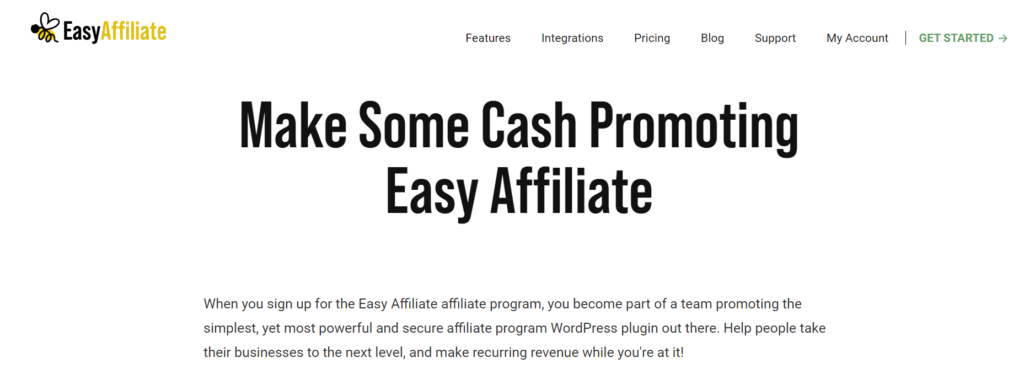
Affiliate programs are a form of performance-based marketing where businesses reward affiliates (individuals or other companies) for driving traffic or sales through their promotional efforts.
The process involves several key components and roles that work together to create a mutually beneficial ecosystem. Here’s a detailed explanation:
Creating and Joining the Program
As someone new to affiliate marketing, you must first create a robust affiliate program to leverage the marketing efforts of individuals and businesses who will become your affiliates.
You can do this through affiliate marketing networks such as Commission Junction and ShareASale, which act as middlemen between sellers and affiliates, helping to find and manage affiliate accounts, or through a self-hosted program.
Upon approval, your affiliates will receive unique IDs and tracking links for their promotions. As an affiliate program manager, you will use these special tracking links to verify a customer’s referral source.
You can also create your own self-hosted affiliate program using Easy Affiliate if you do not want to use third-party networks. The plugin tool offers much better autonomy and control than third-party marketing networks.
However, bear in mind that Easy Affiliate works best with the Pay-per-Sale (PPS) and Pay-per-Lead (PPL) commission models for affiliates, as opposed to the Pay-per-Click (PPC) model used by other affiliate networks.
Speaking of promotions, affiliate marketers can promote your products and services through marketing channels such as blogs, social media, email newsletters, and websites.
You could also provide marketing materials, such as banners, text links, and product images, to help your affiliates effectively promote your offerings.
Once your affiliates spread the word about your offerings, you can track their performance through your Easy Affiliate Dashboard. Here is a support document that shows you how to do this seamlessly.
Your affiliates will then be paid for each sale made through their referrals at the agreed commission rate and payment structure.
Roles of Affiliates and Businesses Within the Ecosystem
Affiliates and businesses each have roles they need to play effectively, as the sum of their parts makes for a successful affiliate program.
Affiliates promote your business’s products or services. They use their platforms and audiences to create content that encourages potential customers to take action.
This action could be making a purchase, signing up for a service, or engaging with your brand. Now, in cases where these affiliates are influencers or creators with respectable followings, they could create valuable content that resonates with their audience and is designed to integrate the affiliate links seamlessly to encourage conversions.
These types of promotions, done by affiliates with significant influence in the digital space, usually carry a lot of weight. They are quite effective because of the enormous conversions they can draw in return for commissions.
Businesses, on the other hand, provide the products or services that affiliates promote and ensure that customer service is always available to facilitate the sales process.
They set the terms and conditions of the affiliate program, including commission rates, payment schedules, and promotional guidelines. They also provide the necessary tools and support to help affiliates succeed.
Also, these entities analyze the data generated by their affiliate program to assess the return on investment (ROI), track performance, and optimize their strategies. This information is then used to refine their program and build stronger partnerships with top affiliates.
Benefits of Affiliate Marketing
Affiliate marketing has become a powerful tool for businesses of all sizes, providing a unique approach to expanding market reach and driving sales.
The benefits of affiliate marketing are numerous, making it an appealing strategy for businesses and affiliates. Here’s an in-depth look at the key advantages of affiliate marketing:
1. Cost-Effectiveness
Affiliate marketing operates on a performance-based model. This means businesses only pay when a specific action – such as a sale or lead – has been successfully completed.
This reduces financial risk and ensures marketing budgets are spent on proven results. It also requires fewer financial commitments, unlike traditional advertising methods such as TV and Print ads, which often require significant upfront investments.
Even more interesting is that businesses typically see an average return on investment (ROI) of 12:1 for affiliate marketing.
This means that for every $1 spent on affiliate marketing, businesses earn $12 in revenue. This high ROI underscores the cost-effectiveness and profitability of affiliate marketing.
2. Performance-Based Payouts
One of affiliate marketing’s most significant advantages is its performance-based nature. Businesses only pay commissions to affiliates when the desired outcome is achieved, whether it’s a sale, a lead, or another conversion.
This ensures that marketing spend is directly tied to tangible results, making it a highly efficient form of marketing.
You should also know that affiliate marketing accounts for 16% of all e-commerce sales in the United States, making it one of the top four sources of e-commerce sales alongside organic search, paid search, and email marketing.
3. Broad Market Reach
By leveraging a network of affiliates, businesses can tap into diverse audiences they might not reach through their marketing efforts.
Affiliates often have established platforms, such as blogs, social media channels, or email lists, that can drive targeted traffic to the business.
Affiliate marketing also enables businesses to reach international markets without establishing a physical presence in those regions.
This is possible because affiliates from different countries can promote the business’s offerings to their local audiences, expanding the brand’s global footprint.
Interestingly, existing data has shown us that this strategy is quite effective as 74% of US online shoppers claim that they visit many affiliate websites before making a decision, highlighting the significant impact affiliates have on purchasing decisions.
4. Enhanced Credibility and Trust
Affiliates often serve as trusted voices in their niche communities. Promoting a product or service through created content can carry more weight than traditional advertising, as their audience is more likely to trust their recommendations.
This trust translates into higher conversion rates for the business, and it will more likely retain the newly converted customers if they feel the quality of the products or services purchased from the company is as advertised by the affiliate.
5. Data-Driven Insights
Affiliate marketing platforms provide detailed analytics and performance tracking, allowing businesses to gain insights into which affiliates drive the most value.
This data can inform future marketing strategies, optimize affiliate partnerships, and ultimately improve the overall effectiveness of the marketing campaign.
Success Stories and Statistics
Affiliate marketing has proven to be a highly effective strategy for many well-known companies. Here are a few case studies and testimonials highlighting the success of affiliate programs:
1. Shopify Affiliate Program
Shopify, a leading e-commerce platform, offers an affiliate program allowing partners to promote its software and earn referral commissions.
The affiliate program has significantly impacted the company’s rapid growth. Affiliates have driven new customer sign-ups, contributing to Shopify’s explosive expansion, especially among small and medium-sized businesses.

Sarah Chrisp, founder of the popular e-commerce YouTube channel Wholesale Ted, has shared her experience with Shopify as an affiliate, noting that its affiliate program has allowed her to establish an authority in the digital space.
She also mentioned that through her content, people purchase the Shopify products she recommends because of the trust and credibility she has built over time with her viewers.
2. eBay Partner Network
eBay’s affiliate program, known as the eBay Partner Network (EPN), is one of the largest and most well-established affiliate programs globally. Affiliates earn commissions by driving traffic to eBay and encouraging purchases on the platform.
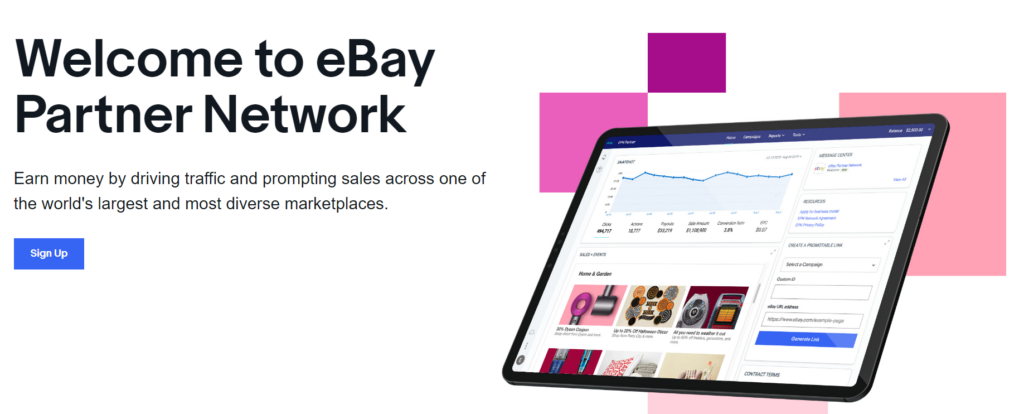
eBay’s affiliate program contributes a significant portion of its revenue. In the United States, where eBay has the largest number of customers, a watch and a smartphone are purchased from the platform every 5 seconds, while a TV, home, or video item is purchased every 4 seconds.
This impressive statistics indicate that there is every possibility that a fraction of the sales could indeed be traced back to affiliate marketing activities proving that affiliate programs are valuable tools for online businesses.
Also, affiliates like Rubens Chello had this to say: “The Smart Suite tools of EPN helped me to a great extent in optimizing my website and with smart placements and dynamic banner ads helped to earn more by matching the branding of the website and the behavior of visitors for higher conversion potential by customizing using the keywords.”
Kyle Schumacher, an eBay partner, also stated, “Through continual testing and growth, eBay helped us enhance our business at each stage of our journey. They have been a true, valued partner.”
3. Amazon Associates
Amazon’s affiliate program, known as Amazon Associates, is one of the largest and most successful in the world. It allows affiliates to earn commissions by promoting any product available on Amazon.
Amazon generates a significant portion of its sales through affiliates. In the first quarter of 2023 alone, the e-commerce giant generated $1.28 billion in revenue through affiliate programs.
This figure underscores the significant contribution that affiliate marketing makes to Amazon’s overall revenue, reflecting the scale and effectiveness of its affiliate program.
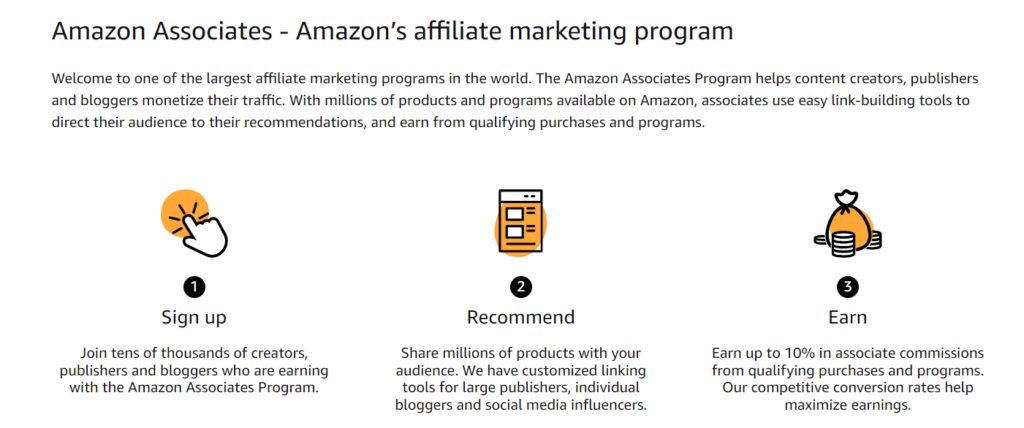
Many affiliates have also reported substantial earnings through the Amazon Associates program.
For example, Impremedia noted: “Since we have a global audience, the Associates Program has helped us to scale our earnings internationally. It’s been simple to sign up, expand, and use!”
BuzzFeed also said, “Amazon Associates has been a critical driver of our commerce initiatives and has enabled BuzzFeed to build a business that first and foremost services our audience.”
These testimonials reflect the broad appeal of Amazon Associates, mainly its ease of use, the trust in Amazon’s brand, and the vast selection of products available for promotion.
Common Concerns and Misconceptions
Many myths and misconceptions about affiliate programs are wrong and unfounded. Below are some of them and the fundamental truths behind them:
Myth: Affiliate Marketing is a “Get Rich Quick” Scheme
Actual Reality: One of the most persistent myths about affiliate marketing is that it’s a quick and easy way to make a lot of money.
In reality, successful affiliate marketers spend years refining their strategies and growing their platforms before seeing substantial earnings.
Affiliates need to build an audience, create valuable content, and continuously optimize their campaigns to generate meaningful income. It’s a long-term business model rather than a shortcut to instant wealth.
Myth: Only Big Brands Can Succeed in Affiliate Marketing
Actual Reality: While it is true that big brands often have the resources to create extensive affiliate programs, small businesses and individual marketers can also succeed in affiliate marketing.
Finding the right niche and offering valuable, targeted content to a specific audience is vital.
Small businesses can thrive by leveraging niche markets where they can provide specialized products or services that meet the needs of a particular group of consumers.
Myth: You Need a Huge Following to Be Successful
Actual Reality: Success in affiliate marketing is not solely dependent on the size of your audience. While having a large following can help, the quality and engagement of your audience are more critical factors.
Affiliates with smaller, highly engaged audiences can often generate higher conversions than those with larger but less engaged followings.
Myth: Affiliate Marketing is Easy and Requires No Skills
Actual Reality: Effective affiliate marketing requires many skills, including content creation, SEO, data analysis, and marketing strategy.
Affiliates need to understand their audience, create compelling content, and continuously optimize their efforts to maximize results. It’s a field that requires ongoing learning and adaptation to stay competitive.
How Easy Affiliate Supports Success
Easy Affiliate is an all-in-one affiliate Affiliate Program Plugin for WordPress that helps you create a self-hosted affiliate program for your WordPress membership site or e-commerce store within minutes.

It offers a suite of tools and services that streamline the entire process, from onboarding affiliates to tracking their performance and managing payouts.
Tools and Services Offered by Easy Affiliate
- Affiliate Dashboard: Easy Affiliate provides an intuitive dashboard for affiliates and program managers. This centralized hub allows affiliates to track their earnings, view performance metrics, and access promotional materials while program managers can monitor overall program performance and individual affiliate activities.
- Commission Tracking: The platform includes robust tracking capabilities that ensure all affiliate-driven sales or leads are accurately recorded. This detailed tracking helps businesses ensure affiliates are fairly compensated for their efforts and provides valuable insights into which affiliates drive the most value.
- Automated Payouts: Easy Affiliate simplifies the payment process with automated payout options. Businesses can set up customized payment schedules and thresholds, ensuring affiliates are paid on time and according to the program’s terms. This automation reduces administrative burdens and minimizes errors in the payout process.
- Integration with Popular Platforms: Easy Affiliate integrates seamlessly with popular e-commerce platforms like WooCommerce, WordPress, and other CRM and email marketing tools. This integration allows businesses to easily incorporate affiliate marketing into their existing operations without needing complex custom setups.
- Customizable Affiliate Program: The software offers extensive customization options, allowing businesses to tailor their affiliate program to meet specific needs. This includes setting custom commission rates, creating unique affiliate links, and providing exclusive promotional materials to top-performing affiliates.
How Easy Affiliate Enhances Effectiveness and Ease
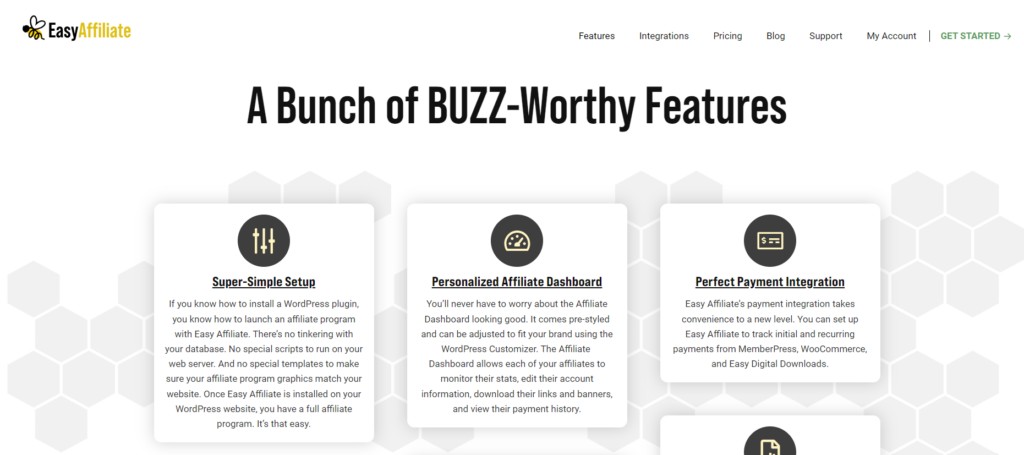
Easy Affiliate enhances effectiveness and ease by automating critical processes like tracking, reporting, and payouts, saving your business significant time and effort. This automation reduces manual errors and ensures that the program runs smoothly and efficiently.
Another unique attribute of Easy Affiliate that makes it practical and easy to use is its friendly user interface. It is built so that you can create and manage your affiliate program without needing technical expertise.
It also gives you better autonomy and the flexibility to do more with your affiliate program, such as monitoring your affiliates’ performance in real time and editing and changing their information where necessary.
You also do not need to pay any middleman fees when you pay your affiliates, in contrast to third-party affiliate networks, as you have total control over your own program.
Finally, with Easy Affiliate, you can pay your affiliates super-fast and ultra-conveniently with PayPal 1-Click payouts and be alerted to suspicious affiliate activity so you can investigate and then flag or reject them before you pay out.
With all of these, you now have an effective affiliate program – one that is built for success and primed to generate more sales and revenue for your business!
Conclusion
Affiliate programs have proven to be a legitimate and highly effective marketing strategy, offering numerous benefits for businesses and affiliates.
These programs are cost-effective, performance-based, and provide broad market reach, making them a powerful tool for driving sales and brand awareness.
By dispelling common myths, it’s clear that affiliate marketing is not a “get rich quick” scheme but a robust business model that requires dedication and strategy.
Easy Affiliate stands out as a valuable partner in this journey, providing the tools and services needed to simplify the management and optimization of affiliate programs.
With features like automated payouts, customizable options, and detailed analytics, Easy Affiliate empowers businesses to scale their affiliate marketing efforts and achieve sustained success.
If you’re ready to elevate your affiliate marketing strategy, explore what Easy Affiliate can offer your business. Take advantage of the opportunity to subscribe for more insights and stay ahead in the competitive world of digital marketing.



Leave a Reply